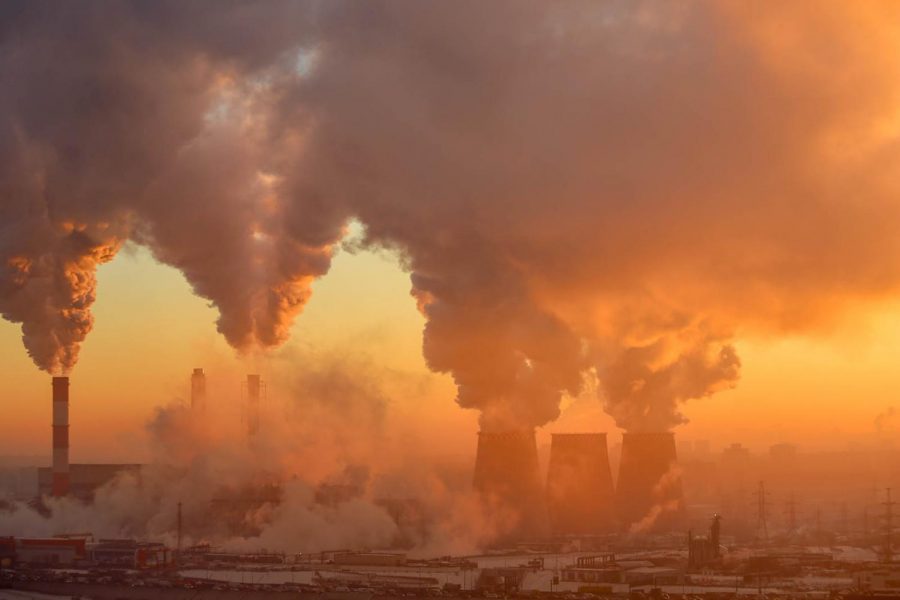Impact of Climate Change
October 24, 2020
On Saturday, Sept. 19, 2020 in New York, a world clock was unveiled which warns that there are seven years until earth’s carbon budget is depleted due to the effects of global warming and climate change. If this happens weather, food, economy and the livelihood of everyone will go through unparalleled changes. For earth to survive carbon emissions must be reduced –– and time is running out.
Over the last half-century, global warming has taken a profound effect on Earth’s environment. Higher temperatures have become a new norm due to greenhouse gases produced by human activities. Common gases used are fossil fuels such as gasoline, diesel, coal, natural gas and petroleum. Fossil fuels are used highly in transportation, electricity and industry. The Intergovernmental Panel of Climate Change contributes 77 percent of the causes of global warming and climate change to these three categories alone.
Emitted greenhouse gases get trapped in Earth’s ozone layer, not allowing it to escape into space. With it not being allowed to escape and in high levels, the trapped gases will continue to propose dangerous consequences.
Trapped gases directly correlate to arbitrary changes to the Earth’s weather. With an increase in heat, the ocean will begin to expand and lead to the sea level rising one-to-eight feet. This substantial rise equates to an increase in flooding, storm surges, melted ice, air pollution and more intense hurricanes. The World Health Organization (WHO) has stated that, “Megastorms like Hurricane Harvey and Katrina have gone from occurring once every 100 years to every 16.” In terms of the near future, WHO expects the Arctic to be completely ice-free in the summer before 2050 and an increase in fire seasons that may last all year long, which will lead to larger and more destructive infernos than ever before.
It does not stop there, a prominent effect of climate change deals with our food. Due to the increased temperature, new challenges arise for agriculture and cultivation. With a decrease in water accessibility, reduction of soil moisture and drought, food is now getting harder to produce. Staple crops like corn, wheat, potatoes and more are less stable, leading to price spikes and food shortages.
Seafood is in danger as well. The ocean absorbs 25-75 percent of fossil fuel emissions making the ocean more acidic. This acid in the ocean leads down to every organism in the seafood chain that eventually gets eaten by humans by methods of fishing or through restaurants.
The biggest and most prominent danger of climate change is how it affects us financially. Sea level rise alone could displace more than 100 million people due to concerns of flooding and hurricanes. Standard homeowners insurance does not include flooding, so many must pay for private insurance or sign up for the National Flood Insurance Program, a program that is currently $20.5 billion in debt from previous natural disasters.
In efforts to combat future possible natural disasters, cities have begun initiating plans to build infrastructure, but this is funded by the locals, leading to drastic increases in taxes. Even without flooding, the average home insurance has gone up significantly. Connecticut has raised their rates up 35 percent, while a number of east coast states have raised theirs to over 50 percent.
The blistering heat has made it extremely difficult for outdoor workers such as construction workers, firefighters, miners and farmers. They must withstand unbearable conditions and risk health factors like asthma, heat stroke, and dehydration. On top of these risks, there is no federal law that protects workers from heat stresses.
The heat does not stop inside homes either. The immense temperature has directly correlated to higher utility prices like the electric bill because of the high use of air conditioning. An increased demand will over-tax the electrical grid, triggering brown and blackouts in the future.
So, are we doomed? Not if we act swiftly. There are a number of valuable solutions that can be done to balance our emission rates and protect Mother Earth, whether by the government or everyday citizens, but we cannot wait long. Time is ticking and time waits for no man.







